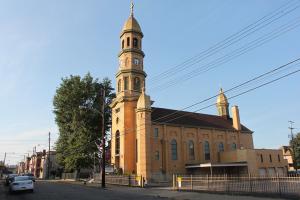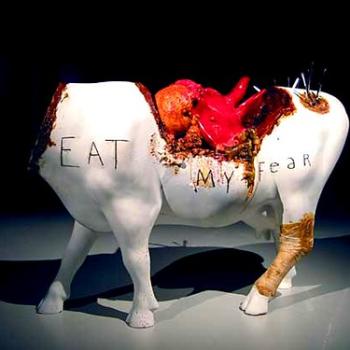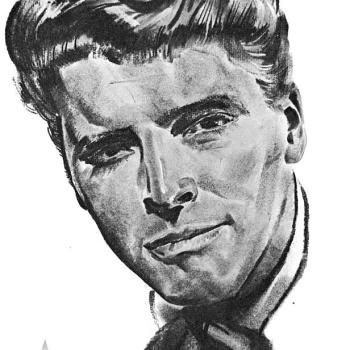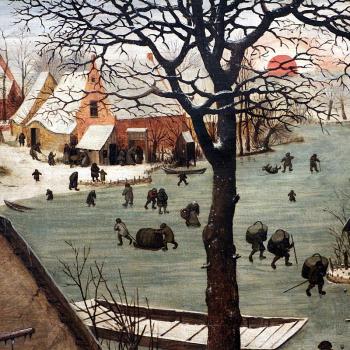
Source: Flickr User Joseph
License
In recent years, I have mostly avoided weighing in on specific religious issues or controversies. I’ve preferred to spend my time reviewing films, reading, and passing time with my wife and friends while quietly going about the practice of my faith. Recent news about the former Fr. Hilarion Heagy (now Mr. Troy Heagy) apostatizing and becoming Muslim seems to have broken from the bounds of my little Byzantine Catholic world. Coming from this small tradition and having seen people take journeys like this one before, I feel it’s incumbent upon me to say something. People keep crying out in confusion and pain. That’s sensible; it’s not everyday a presbyter leaves not just his particular church or branch of Christianity but the religion altogether. At the same time, there’s something sadly predictable about the whole affair. Perhaps some may take solace in that, while others might lament it. For my part, I just suspect it to be the truth.
First, then, the story itself. Over about 15 years, Heagy was variously an evangelical, a Roman Catholic, a Russian Orthodox priest-monk, Antiochene Orthodox, and Byzantine Catholic. He is clearly a seeker, a restless soul dedicated to discovering the truth as he sees it. Having been his Facebook friend for years, I saw Heagy move around between monasteries (apparently he has publicly called at least one of his former abbots a sociopath, though without direct knowledge of the situation, I can’t add anything). During these wilderness years, he pursued a masters degree at Marquette University (I am told supported in large part, if not entirely, by donations) and started a GoFundMe to found an Eastern Catholic monastic studies center in Texas. As of February 2023, the campaign has raised over $4100, with an update from Heagy suggesting an additional $7000 not reflected in the page’s total.
None of it, from what I have been told, has been returned.
While living the peripatetic life, Heagy was quite active on social media, specifically in gathering young, reactionary men around him (that his studies could be funded largely, if not solely, by donations should sketch the scale). Some of these people still speak very highly of him and his willingness to counsel and support them. I have no doubt he was helpful to them in growing as human beings and in faith. Still, I found the situation off-putting. The talking points and memes formed a little community akin to a 4chan board, but with a priest at its center. You’d see the most reactionary positions mediated through second-hand talking points. I felt as if looking at Heagy’s profile gave me a good idea of what narratives and jokes relatively far-right media were pushing that particular day (not that I have not been guilty of similar things; we’re all subject to currents in the media we read. The point is to acknowledge and understand one’s situation). In that way, the whole thing felt horribly un-self-conscious and, if nothing else, unbefitting an online clergy member—it was all a bit too younger, hipper Mr. Frank Pavone.
That’s the crux (pun unintended) of the matter—reactionary anger at modernity was at the core of what “religion” meant in that circle (not necessarily for everyone, but, as we shall see, seemingly in Heagy’s case). On his new blog (I won’t be linking to it, since my purpose here is to clarify matters for those who already know the broad strokes; I have no interest in broadening his reach), he highlights the sense of community he felt when he first went to a mosque, how organic the faith and fellowship felt, and how hard it was to remain publicly a Christian priest while secretly being Muslim (for 5-6 months) .
Notice that the qualities he treasures are essentially manifestations of a premodern, organic sense of community. I have no doubt that largely immigrant-rich and first-generation mosques in the US retain these qualities in a way most churches do not. One could have said much the same of the Catholic ethnic parishes of the 30s and 40s (or earlier). Newer communities are always more tightly knit (and diaspora groups tend to hold to conserve traditions in a way those in the homeland do not). More than that, Islam (for complicated historical reasons I won’t get into here) has not been transformed by the same pressures to liberalize that Christianity and Judaism have, especially in the West (the age of Nasser was a short one). Predictably, then, such a faith tradition will retain more markers of an idealized premodernity.
But faith in Jesus Christ (or any religion, I hope) is not about social policies or forms of community. It’s about transformative belief in a person, a precept, an institution—something beyond oneself that transcends one’s feelings about social organization and family dynamics. Christ died and rose again whether we live in the smoldering ruins of civilization or a cabin, plump with food and drink, in a woodland village. If Christianity is nothing but a socio-political position, a very modern one at that (in its nostalgia for an imagined golden age), what’s the point? Isn’t that the orthodox Marxist perspective, that religion is no more than a prop for existing hierarchies?
And that’s what completes the portrait here: an intellectualized, abstract faith. When combined with the reactionary sensibilities and longing for “organic community” noted above, we have a familiar type. This is René Guénon. It is Ryan Hunter. It is the tale of Houellebecq’s Submission, the endpoint of a strident commitment to Jordan Peterson’s conception of order, the journey of Andrew Tate.
I am, perhaps, being a bit hard on Peterson fans (since his ideas are not, strictly speaking, about particular religions). But all online Byzantine Catholics know a version of this story. So many visit our churches because they are traditionalists and reactionaries, seeking refuge from the Latin Church. In no time, this drive for purity leads them to Orthodoxy and eventually a smug anti-Catholicism (Catholicism is not “organically rooted enough” like the church in Russia or Bulgaria or something). Those who take that commitment seriously end up Muslims. Orthodoxy, situated in Europe and subject to the twin pressures of liberalization and post-Communist existence, does not satisfy. Islam is, after all, the only Abrahamic religion with both a universal claim and some broad semblance of the imagined premodern.
The young and impressionable end up like Trevor Bickford, driven on by youthful rage to foolish Wahhabism. The more mature, the more intellectually inclined—they become Sufis. The impulse is the same, though the results are spectacularly different. In both cases, however, the desire for organicity and reaction trumps all.
I intend nothing negative about Islam here. Cat Stevens (now Yusuf Islam) did not convert for reasons that look anything like those I’ve just outlined. Islam represents premodern bliss to these people because of the current historical situation, not because of anything intrinsic to that religion itself. I’m not sure it’s possible for anyone but a listless European or American to fetishize Islam in this way (the British Empire before us had its fair share of converts for similar reasons). Indeed, I wonder if some Muslims do not regard such seekers the way some Byzantine Catholics do Latin Trads who start frequenting divine liturgy: of course you’re welcome. But are you doing this for the right reasons?
There is, then, nothing particularly special about Heagy’s story. Obviously as a Christian, I find it sad. But I don’t think he’s a cynical conman or doing anything consciously malicious (though he should return the money, I suspect that is more of an oversight than a planned absconding). His decision to post an image of the Muslim profession of faith right before deleting his account does not suggest great maturity. Nothing I’ve seen so far does. But I pray that Heagy may grow, whether in his new faith or in some other. I hope he’d do the same for me.
What matters now is that, shocking as it may seem, there’s nothing much new here. So long as religion is a buttress for one’s biases and politics, rather than a transformative belief, such stories will proliferate.













